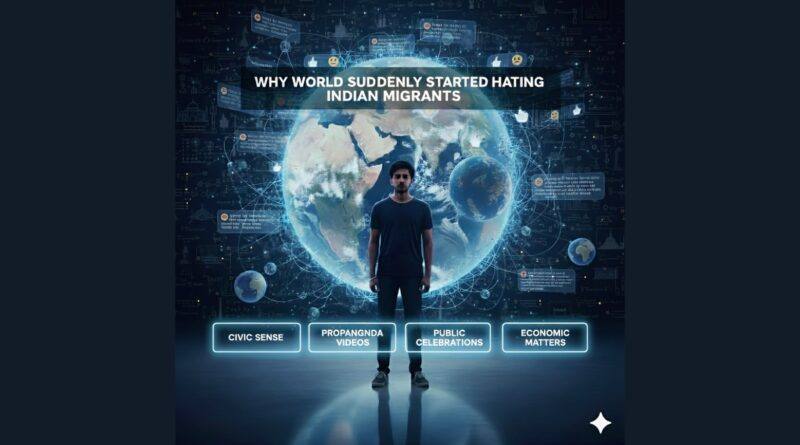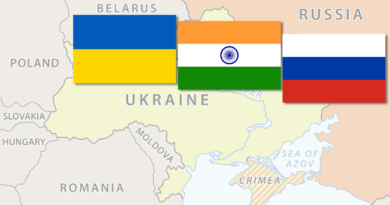Why The World Suddenly Started To Hate Indian Migrants
Why the World Suddenly Started Hating Indian Migrants? The Significance of Adapting.
From Pride to Prejudice: A Changing View
For decades, Indians have been one of the most respected migrant communities around the world. From the Silicon Valley engineers, to NHS doctors and nurses in the UK, to teachers in Africa and entrepreneurs in the Middle East, Indian migrants earned admiration for their skills, discipline, and hard work. Countries welcomed us warmly, seeing us as contributors to progress.
Today, however, the atmosphere has shifted. While Indians continue to achieve globally heading top companies, winning awards in science and culture, we are also facing rising dislike, mockery, and even open hate in many parts of the world, specially in social media.
The New Hostility
In recent years, incidents of anti-Indian behaviour have grown:
Ireland has seen violent attacks on Indians, often led by angry youth which are mostly under 20 years of age.
Australia witnessed anti-immigration protests where Indians were singled out as “taking over.”
The UK, Canada and the US are seeing anti migrant protests, online campaigns and political speeches blaming Indians for job losses and high housing costs.
This sudden shift is not random, it has clear reasons behind it.
Why the Hate?
- Online Videos on Civic sense: Many online videos are being widely spreaded globally on Indian Civic sense in foreign countries. Videos like having food and improper behaviours in public transport, throwing trash irresponsibly, spitting pan masala in public, bathing with soap in swimming pools & fountains, asking for money after cleaning car windscreen without being requested to, manipulating accidents for compensation which all are illegal. But some of the videos are propaganda videos or prank videos.
- Celebrations in Public Celebrations done in public places are creating widespread hate in the minds of the locals. Celebrations such as Indian Cricket wins, Indian Independence & Republic day, religious celebrations like ratha yatra, ganesh chaturthi, holi, Eid al-Fitr, pro palestine rallies, church processions. Even though these activities are done with approvals from the government authorities, these are adversely affecting the relationship with the local communities.
- Lifestyle and Behavioural Issues: In many places, Indians have been criticized for public habits. Making dance reels and jokes by disturbing the public, being too loud in groups, playing music loudly. Complaints also include lack of neatness in shared spaces, leaving litter and disturbing others in residential areas. These behaviours, though done by a few, affect the image of the whole community.
- Economic Tensions: Indian migrants are highly qualified, often securing good jobs in IT, healthcare, and education. While this reflects hard work and talent, locals sometimes feel they are being left behind. Large numbers of Indian migrants increase demand for housing. In cities with housing shortages, this leads to rising rents and house prices, which locals blame on migrants.
- Global Anti-Immigration Sentiment: Around the world, far-right groups are growing. Their message is simple: migrants are to blame for local problems. Indians, being one of the largest migrant groups, often become an easy target. Continued Pro Palestine rallies and protests are creating anger against the whole asian migrants which affects Indians too.
- Easy targets to Coverup Illegal Migrants: Illegal migrants are a big burden for many nations now a days and governments are not able to control the numbers even with strict regulations. Many right-wing Politicians try to divert the anger against the illegal migrants towards the legal Indian migrants too for their own political gain.
The Real-World Consequences
The combination of these factors has led to serious consequences:
- Migrant laws are becoming more and more strict day by day.
- Indian students are forced to return home after study with heavy loans due to regulation changes.
- Indian migrants abroad now worry about their safety.
- Hate crimes against Indians have been rising, especially in Canada and Ireland.
- Peaceful neighbourhoods are sometimes divided, with locals resenting new Indian communities.
The Way Forward: What Indians Need to Do
Indians cannot control global politics or racist groups, but we can work on building stronger relationships with local communities. Steps that can help:
- Avoid Public Celebrations – Celebrations must be done in confined spaces without disturbing the public.
- Respect Local Culture and Space – Follow public rules, avoid loud behaviour, keep shared spaces clean, and be mindful of neighbours.
- Positive Representation – Highlight achievements in media and community life to break stereotypes.
- Community Engagement – Participate in local events, volunteer, and mix with the wider society instead of staying isolated in migrant groups.
- Speak Up Against Racism – Report hate crimes and demand fair treatment, but without aggression.
- Show Unity and Responsibility – Support each other abroad while also correcting behaviours that give fuel to negative stereotypes.
Conclusion
The world’s “sudden hate” against Indian migrants is not entirely sudden. It comes from a mix of economic pressure, cultural misunderstandings, and sometimes irresponsible behaviour by a few individuals. At the same time, it is also driven by rising global nationalism.
Indian migrants have achieved extraordinary success worldwide and we still have the ability to shape our image positively. By being responsible, respectful, and active members of the new societies, Indians can turn hostility back into respect.
The challenge now is to balance pride in identity with sensitivity toward others, proving once again why Indians have long been among the most valuable migrant communities in the world.




